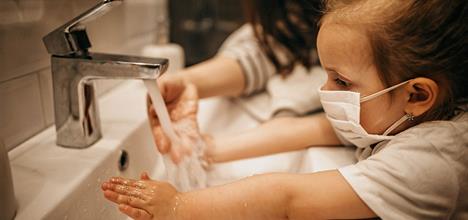Safeguarding Children's All-Around Health
"When it comes to kids, what I think people have not done a good job of is looking at the overall well-being as important, as opposed to just focusing on COVID.""And it's become completely clear over the last year-and-a-half that we're causing an immense amount of harm to kids by locking them in their homes.""While some of those kids can get very sick, most of them respond really quickly to treatment. [The higher we can drive immunization rates of the 12 and older, putting a protective ring around children too young for vaccination] the better off we will be.""At some point we're going to have to get used to it as another virus that is circulating. I don't know when that point is, but I think people need to start thinking about that.""[It's not a science perspective], it's more of a view of society and freedoms. And I am very loathe to impose on people things they don't want to do."Dr.Ari Bitnun, pediatrician, SickKids, Toronto"I won't lie. I'm worried myself. I'm really worried not just about hospitalizations, but long-term health consequences.""It's extremely upsetting to me."Dr,Dawn Bowdish, immunologist, McMaster University, Hamilton, Ontario
 |
"That's probably the most important question we need to learn in the next six to 12 months [how Long COVID manifests in children]. How prevalent is Long COVID? What does it actually look like.""Of course it's not fine [if a few kids get sick when we argue children need to be in school]. Every single individual who gets sick and has to go to hospital, God forbid is one too many.""But what is the alternative? We've pretty much had children out of school here in Ontario for over half the year last year.""Intolerable, it's untenable to think about."Dr.Ronad Cohn, president CEO, SickKids

Published data indicate heightened levels of anxiety and depression among children and youth, the acknowledged fallout from the seemingly endless pandemic, and the manner in which it affects children in our suddenly altered world culture of alienated society careful of the fearsome effects of the SARS-CoV-2 virus causing COVID-19. Dr. Bitnun is familiar with the sight of young patient home-schooled for an entire year, barely leaving home, with easy access to a refrigerator, who have gained an absurd 40 kilograms in that interim from normal life.
Greater numbers of children in the United States are being admitted to hospital with COVID-19 in those states with low vaccination rates. Spurring concerns of just how safe is it to return children to the classroom, and most particularly those under age 11 who are unvaccinated...? The spread of the Delta variant has thrown hopes for control of the COVID infection rate for a loop. In some of the most populous areas of Canada case counts are increasing.
Children infected with COVID tend to demonstrate mild symptoms such as headache and fatigue. For many, no symptoms whatever manifest. And COVID deaths among children remain rare events. Children of all ages can carry high SARS-CoV-2 viral loads whether they have symptoms, or none, according to a recently published paper. That same paper suggests that children are capable of spreading COVID; Children have the potential "to serve as a community reservoir of actively replicating virus, with implications for both new waves of infection and the evolution of new variants".
As for the Delta variant; is it more virulent, more dangerous to children, will it make them more ill than the U.K. variant, or the original strain? Above all, children's susceptibility to acquiring Long COVID is an unknown. It was first identified in adults when people reported a strange array of symptoms; brain fog, breathlessness, headache, heart palpitations for weeks, even months following a mild dose of COVID. For children, data has been puzzlingly conflicting.
Long COVID was found to occur in school-aged children, but remains uncommon, according to a large study out of the United Kingdom. 4.4 percent of 1,734 children involved in the study had lingering symptoms a month after experiencing a COVID infection, yet by eight weeks almost all had recovered. The Office of National Statistics in the U.K in another study estimated closer to 10 percent of two- to 11-year-olds and 13 percent of children ages 11 to 16 had at least one lingering symptom five weeks after infection.
In the United States in major children's hospitals in Florida, Texas, Missouri and Arkansas pediatric cases are on the rise. Almost all admissions involve children under age 12, not yet eligible for shots or teens who haven't been vaccinated. The more virus circulates, in particular hyper-contagious Delta, the more likely it is that children will get infected. Small numbers becoming sufficiently ill heading for hospitalization.
By mid-August, children under 19 accounted for 15, or 0.1 percent of COVID-related deaths, along with 1.9 percent of hospitalizations since the pandemic's start, in Canada. More admissions occurred, related to a post-COVID complication known as MIS-C (multi-system inflammatory syndrome in children) than for COVID. Different parts of the body such as heart, lungs and kidneys can become inflamed, typifying MIS-C. Obesity stands out thus far as the most common underlying risk factor for severe COVID.
Polls indicate that American parents clamour for their children to return to in-class learning, despite the spike in U.S. COVID cases. No one is interested in downplaying risks of COVID to children. The risk-benefit analysis varies in every family, yet it is monumentally difficult to tolerate any risk whatsoever when it comes to the protection of children.
"Marinating in a toxic brine of fear and uncertainty can make us sick -- whether from fatigue and insomnia or irritability and burnout.""And when our children hear us processing endless loops of what-if thinking, they can become worried and depressed too.""Fixating on a single threat to children's health can keep us from recognizing their broad human needs."Dr.Lucy McBride, practising internist, Washington, D.C.
Labels: Children, Classroom Attendance, COVID Complications, COVID-19, Infections


0 Comments:
Post a Comment
<< Home